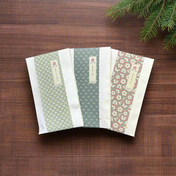What's Nigari ?
NIGARI…Have you heard of the word? If not, how about NIGAI, then?
Buy Nigari from the Noto Peninsula, Ishikawa
Nigai (苦い) means bitter in Japanese. Nigari (苦汁) came from this linguistic root. Nigari is the liquid that is left after salt has been precipitated from seawater. Nigari has been very important for people’s lives in Japan though initially it was just a by-product from salt-making, and yes, it does taste bitter.
In the old days, especially in the area of making salt, Nigari was used for healing scrapes and cuts. Nigari contains lots of minerals especially magnesium chloride, and more than 50 types of minerals such as calcium, potassium chloride. The magnesium helps to heal wounds.
However, the most important role of Nigari has been as a coagulant for making Tofu (bean curd) since Tofu was brought from China in the 7th century. Several types of coagulants for Tofu were invented in the last 100 years, and the new coagulants are easier to handle than Nigari, but Nigari is still popular for making Tofu. Why do you think Nigari is so popular? Because… Tofu made with Nigari is delicious! The bitterness in Nigari brings out the umami savoriness from the soy beans, the main ingredient in Tofu.
Nigari's New Wave
Recently in Japan, Nigari has gathered attention in a different way. Although minerals are important nutrients for the human body, many Japanese do not have enough minerals in their diet, especially magnesium, since they are eating less traditional foods such as brown rice, seaweed and soybeans. So, people started to take Nigari to maintain good health. Nigari is not only good for your body, but also brings out the umami taste in foods, such as Tofu.
You can use Nigari in many ways. I'll show you how you can use it in your life.
1. Add a few drops into Your Cooking and Drinks
Add it into tea, coffee or any drinks. Someone said he liked adding into whisky as Nigari makes the taste milder like aged whisky!! Nigari makes meat tender if you add it when stewing.Try adding in if you cook rice, you’ll have shiny and springy rice.
2. Feed Diluted Nigari Water to Your Plants
Dilute to 1000-2000 times and give the water to your plants such as flowers, tomatoes, peppers and watermelons every 4-5 days. Vegetables and fruits become sweeter.
3. Make Tofu
Try it ! Easy Recipe: Make Tofu from Soy Milk at Home !

Today's Recommendation
Nigari (Bittern, 100 ml) from Suzu, Noto Peninsula, Ishikawa
Uses the seawater in Oku-Noto, where has the junction between the warm current and the cold current containing various types of minerals.




